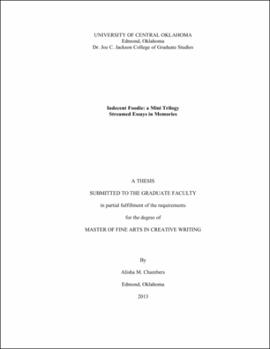| dc.description.abstract | The eighteen essays in Indecent Foodie: a Mini Trilogy speak of how alone and ashamed, a promiscuous woman deprives herself of healthy attachments, healthy intakes, and healthy perspective. She devours the world and hides her obesity. Her coming of age transforms her from a curious, good girl into a dirty, slam pig before she can find a way to balance the two. Good food, good family, and just a little bit of danger stabilize this promiscuous girl and give her the courage to love an over-the-top man and conquer her guilt-ridden past. The first section of essays touches on the dangers--perceived or real--present in the narrator's life. Their intent relies on the creation of a neurotic persona, one that both seeks and fears dangerous situations. Control seems to heighten her panic and damage her perception of herself, her actions, and those she allows herself to associate with. These ideas leak into the next mini memoir--showing the dangers of love. The second section touches on several faucets of love--the fun, the new, and the difficult, for the self, for subjects and hobbies, for sharing. These essays are the most diverse, as love often proves the case. A direct correlation is shown between new love and established love--or the realistic portrayal of marriage, as the narrator shows can be a constant battle to maintain and understand. As the section continues, the narrator demonstrates a love for culture--family culture, food culture, and a fascination of popular culture. Yet, "I Can't Believe It's Not God," begins another transition of awareness of self and again hitting on the idea of control. However, the overarching theme, which connects the beginning and ending mini memoirs, demonstrates this search for love through means outside the self as unhealthy as a means of coming to terms with one's past. Finally, the last of the mini memoirs focuses on reflection of family and the past. The narrator takes on the persona of her parents in order to understand their behavior and her turbulent childhood home and family. An exploration of memory ends the section, and the fear resurfaces, leaving the reader with both growth and an inability to move beyond one's past. Limitations are real for this narrator, and her stories show an attempt to come to terms with past rather than redeeming herself and taking on the freedom of a new personhood. | |
